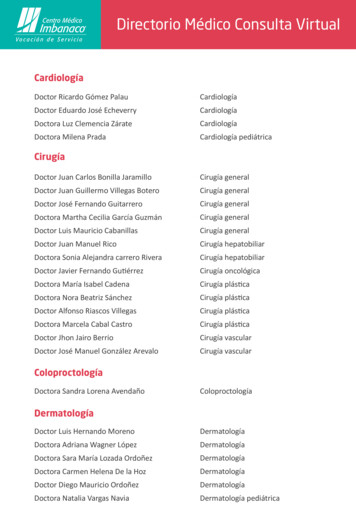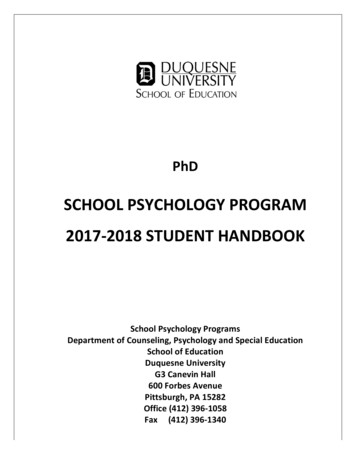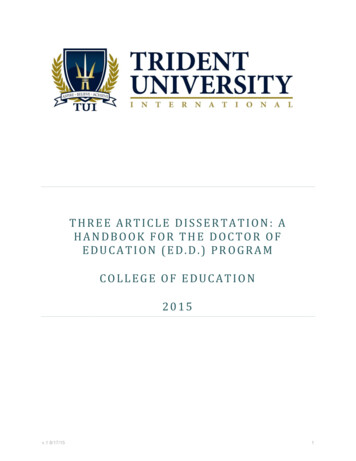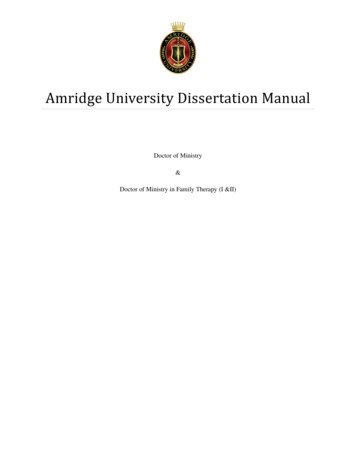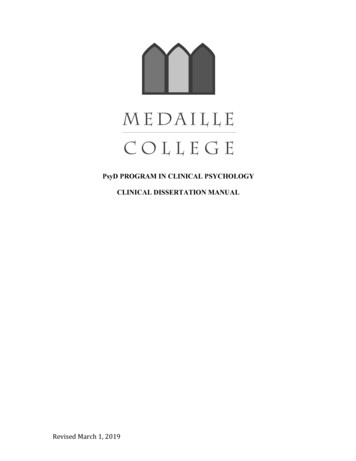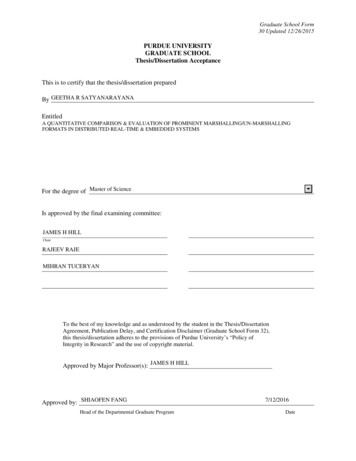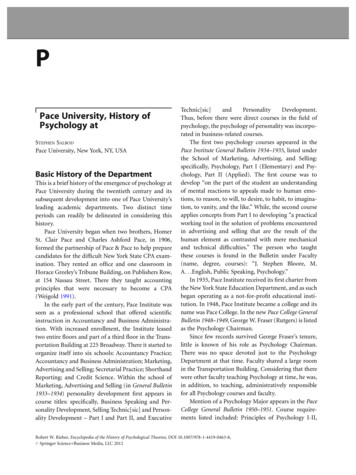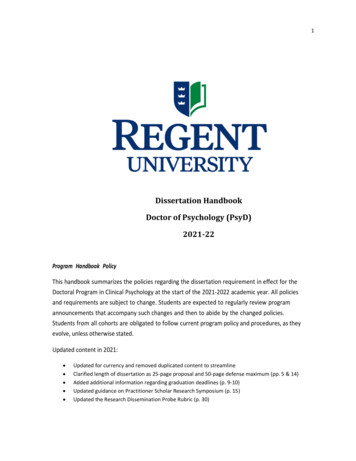
Transcription
1Dissertation HandbookDoctor of Psychology (PsyD)2021-22Program Handbook PolicyThis handbook summarizes the policies regarding the dissertation requirement in effect for theDoctoral Program in Clinical Psychology at the start of the 2021-2022 academic year. All policiesand requirements are subject to change. Students are expected to regularly review programannouncements that accompany such changes and then to abide by the changed policies.Students from all cohorts are obligated to follow current program policy and procedures, as theyevolve, unless otherwise stated.Updated content in 2021: Updated for currency and removed duplicated content to streamlineClarified length of dissertation as 25-page proposal and 50-page defense maximum (pp. 5 & 14)Added additional information regarding graduation deadlines (p. 9-10)Updated guidance on Practitioner Scholar Research Symposium (p. 15)Updated the Research Dissemination Probe Rubric (p. 30)
2TABLE OF CONTENTSIntroduction . 3Christian integration. . 4Regent Psy.D. Peer Discussant Scholarly Standard . 4The Regent PsyD Dissertation Process . 4Formulating a Topic . 4Writing a Proposal (PSY 700) . 5Timeline for Dissertation . 5Writing Conventions for Dissertation in the PsyD Program. 10Dissertation Meetings . 10Dissertation Proposal and Defense Meetings . 10Proposal & defense M e e t i n g process . 11Human Subjects Review . 12Implementing the Dissertation Project . 13Present Dissertation at Practitioner-Scholar Research Symposium . 14From defense meeting to Library Submission . 16Copy editing . 17Continuous Enrollment . 17Publication and Presentation of Dissertations . 18Formatting the Dissertation . 18Registrar’s Office Policy regarding passing your dissertation . 21APPENDIX A: Sample Dissertation Prefatory Pages. 23APPENDIX B: Dissertation Checklist Form. 25APPENDIX C: Dissertation Forms . 28Appendix D: Research Dissemination Probe Rubric . 29
3INTRODUCTIONThe mission of the Doctoral Program in Clinical Psychology (DPCP) at Regent is to strive to:1. Educate doctoral students in a broad and general clinical practitioner scholar model, toobtaincareers in health services psychology.2. Educate students in integration of psychology and Christian worldviewThe dissertation should reflect the student’s emerging ability to provide scholarly leadership inthese areas. Such leadership involves making a substantial contribution to the field of psychology. Acommensurate level of excellence is required in the conceptualization, development andmanuscript writing of the dissertation. The project itself may take many forms including: A program development and evaluation A quantitative analysis of the relationship between psychological constructs A qualitative or descriptive analysis of a psychological phenomenon The creation of a new scale or psychological measure The replication of a previously published research study The creation of a new intervention with an in-depth case study applied to anindividual, family or group A service project to meet the needs of a community A needs assessment of a community An in-depth case study An in-depth literature review A clinical or psychological experiment Another project exploring psychology and approved by the dissertationcommittee
4CHRISTIAN INTEGRATION.The dissertation should address issues or areas of relevance related to matters of Christian faith orworldview. Such connections should be explicitly examined in a manner sensitive to the diversereligious perspectives relevant to the topic. In such discussions, the level of interaction with the fieldof psychology should be of a level commensurate with advanced doctoral candidate.If the topic of the dissertation doesn’t include Christian integration students should write asection of their discussion section addressing Christian integration with their topic.REGENT PSY.D. PEER DISCUSSANT SCHOLARLY STANDARDRegent’s Doctoral Program in Clinical Psychology (Psy.D.) is committed to a practitionerscholar model of training with the primary goal of preparing its graduates to be professionalswho apply the discipline and science of psychology in a practice setting. Although research skillsand field science abilities are part of the competencies we aim to instill in our graduates, we arenot attemptingto prepare our modal graduates for traditional research careers. Consistent withthis training vision, our students must demonstrate a peer discussant standard of scholarship in theirdissertation projects.A peer discussant standard is evident when one demonstrates mastery of the scholarshipin an important psychological area and an ability to make a meaningful application, utilization,extension, or novel contribution to that area.Note: In contrast to traditional research focused degrees, the peer discussant does not requirestudents make substantial novel contributions to the scientific body of knowledge. While such anachievement would demonstrate the peer discussant standard has been met, other suitableapplied scholarly goals than novel scientific discovery may alsosatisfy this standard. Thus, thishandbook outlines diverse types of acceptable dissertation projects that could meet the Regentstandard.THE REGENT PSYD DISSERTATION PROCESSFORMULATING A TOPICAn appropriate dissertation stems from a well-formulated topic which is pertinent tothe fieldof psychology. A variety of activities, such as completing guided readings or participatingin a faculty research team, can act as catalysts for development of the dissertation topic.Student should actively work on developing their research topic as soon as they get established
5the doctoral program (e.g., spring semester first year). Often early academic projects, such asterm papers or student presentations, may provide the impetus for the dissertation topic.Intellectual curiosity and diligence in mastering a research area are valuable factors in arriving ata good dissertation topic.Overlap with faculty expertise and interest. Although students are encouraged to pursuedissertation topics that are of personal interest, it is vital that these interests are consistent withexisting scholarly interests, expertise and/or activities of the Psy.D. faculty. Some dissertationtopics may lie outside the areas of expertise or interests of current faculty. In such cases, securing adissertation chair and committee may be difficult. Students are expected to find a topic withinthe research interests and competence of Psy.D. faculty. The most natural way to accomplish thisis coordinate formulation of the dissertation topic with ongoing faculty research projects.WRITING A PROPOSAL (PSY 700)All Psy.D. students enroll in the Dissertation Methodology seminar (PSY 700) in thespring ofthe second year. The course focuses on the following areas:1. Exposing the student to the variety of dissertation options available.2. Reviewing foundational research strategies and dissertation procedural details.3. Writing of the initial draft of the Dissertation proposal. The dissertation proposal includes a draftof the literature review and method section of the dissertation.4. Reviewing the Journal Article Reporting StandardsLength of proposal: The length of a proposal is generally 25 pages of writing (not includingtables, appendices, and references).TIMELINE FOR DISSERTATIONSPRING OF SECOND YEAR (DURING PSY700 CLASS).1. Selection of committee and topic.a. As part of PSY700, students should have identified a faculty member in the doctoralprogram who is willing to serve as their dissertation committee chairperson.b. The Dissertation Topic Approval form requires the student to obtain a dissertation chair, lista topic approved by the chair, and finalize the dissertation committee.
6c. The minimum dissertation committee will consist of two individuals, a chair, and amember. The Chair must be a member of the Psy.D. faculty (core faculty or affiliate).d. Any exception must be approved by the Program Director.2. Roles of Committee and Chaira. The Chair of the Dissertation works as the primary mentor, guide, and oversight tothe dissertation process from selection of topic through final revisions. The chair isgenerally the second author on any presentation or publications. In general, all draftsand revisions of a dissertation are completed with the dissertation chair prior tosubmitting the work to the committee member/s.b. The Committee member/s provides insights and approval of the project. Thecommittee member reads the proposal and gives feedback, attends the proposal anddefense meetings, and provides approval of the project.2. Qualifications of a Dissertation Committee (Chair or member)a. The dissertation chair or committee member holds a doctoral degree, such as Ph.D. or Psy.D.that reflects expertise in the field of clinical psychology or a field closely associated with thestudent’s particular project. For example, a student working on a theoretical paper thatfocuses on theological as well as psychological concepts may want a committee member whoholds a Th.D. or D.Min. Similarly, a student working on an empirical study related to a medicalissue may want a committee member who is a healthcare professional with expertise in thespecific area and training/experience in research who holds an appropriate degreeconsistent with the profession (e.g., MD, PhD, DPT, etc.).b. An external member must be approved by both the committee Chair and the Psy.D. ProgramDirector. Note: The approval is given through signature of the program director on theDissertation Topic/Committee Approval Form. Advance discussion between the chair and thedirector to ensure approval will be granted prior to formally asking an external member to bethe committee member is expected.3. Approval Process for Exception to Core/Affiliate Faculty Chair Policy:a. The student should discuss the proposed chair with the PsyD program director to ensureapproval will be granted prior to formally asking an external chair.
7b. The student obtains the proposed chair’s signature on the Adjunct Dissertation ChairStatement of Understanding form (located with Dissertation forms on PsyD Resourcepage).c. Submit the Dissertation Topic/Committee Approval form (with chair and committeesignatures) and Adjunct Dissertation Chair Statement of Understanding form (with thechair’s signature) to the program director forapproval.d. Signature of the program director on the Dissertation Topic/Committee ApprovalFormconstitutes form approval.e. If an exception is approved for chair not to be a core faculty member, then the committeemember must be a core faculty member.2. Completion of the first complete draft of the dissertation proposal is required for a student topass PSY700. Students who do not complete the requirements for PSY700 will receive an incomplete andhave one semester to complete requirements. If still incomplete they will receive a failing grade and must take PSY700 again. They will also be unable to take PSY718 until passing PSY700, whichslows down theirprogression in the program by a year. This is because students must propose theirdissertationin order to take their comprehensive exam and must pass their comprehensive exam tocontinue in the program. Students who are falling behind on their dissertation proposal shouldbe aware of this “roadblock” in the program and consult with their advisor on issues thatprevent them from timely completion of the requirements for PSY700, PSY718, and proposingtheir dissertation on time. Multiple drafts are typically required, therefore, students should plan to work steadily onthe proposal for the year following completion of PSY700 to ensure completion by therequired date.SUMMER OF SECOND YEAR AND FALL OF THIRD YEARStudents will work closely with their dissertation chair to craft revisions of the proposal.Typically, this will include 3 -7 drafts of the paper. Two-week turnaround time is expected byboth parties- the student and the faculty.SPRING OF THIRD YEAR (DURING PSY718 CLASS)
8In a normal timeline students will propose their dissertation in spring of third year.Students following a typical Student Educational Plan (SEP) and moving towards internshipapplications in thefall of 4th year should register for PSY 718, Professional Development andDissertation Proposal Development for the spring of third year.In order to pass PSY718 the dissertation chair must endorse a passing grade, indicating thatthe chair of the committee has approved the final written draft of the dissertation proposal.Note: The course instructor for PSY 718 must hear from the dissertation chair that thestudent has passed or a “no pass” will occur. In order to meet this timeline, the dissertationproposal must occur prior to the end of the spring term.It is important to plan to have the dissertation proposal completed by the time PSY 718grades are due (end of spring term) and to discuss methods for continuing in the summer whenneeded. If expected to go beyond this date, a formal extension request should be submitted.Extension to the date of completion required for clearance to take the comprehensiveexamine (June 30) is the maximum typically considered.SUMMER OF THIRD YEARAccelerated Timeline: Students attempting to defend their dissertation prior to internshipinterviews will need to work on an accelerated timeline in which they propose theirdissertation by end of fall of third year, collect data in spring of third year, and defenddissertation in fall of fourth year. Students should discuss their plans for a timeline withtheir dissertation chair and realistically plan for the increased workload involved in thistimeline. Students who have already defended their dissertation by the time they completeinternship interviews typically receive higher ratings from the internship site.Students who have not proposed their dissertation by the end of June of the summer ofthird year will not be approved to take Comprehensive Exams in July of third year. PassingComprehensive exam is a requirement to engage in fourth year training and preparation forinternship.Student who do not pass PSY 718, or who have still not successfully proposed their dissertation bythe end of the summer semester will be enrolled in PSY 719 Proposal Continuation until theysuccessfully pass their proposal.The student may need to add a year to their SEP and take the Comprehensive Exam the followingyear. In order to maintain a good pace, students should submit an application for Human SubjectsReview, as soon as their proposal has been accepted (ideally in the summer of third year).
9Please note, the Human Subjects Review Committee does not operate during a portion of thesummer(June 15 until the first day of classes for the fall term).FALL OF FOURTH YEARStudents must submit a Human Subjects Review application for their dissertation andsuccessfully have it approved prior to being approved by the Director of Clinical Training (DCT) toapply for internship. The deadline for project approval is October 1. Students are expected tocollectdata or implement their project in fall of fourth year.SPRING OF FOURTH YEARIn an ideal timeline, the student has completed their data collection or project anddrafts their dissertation defense in spring of fourth year. While students can leave forinternship without completing this stage of the dissertation, this is not recommended. Studentsare required to present the results of their dissertation in poster format as part of thePractitioner Scholar Research Symposium (see Present Dissertation at Practitioner-Scholar ResearchSymposium (PSRS) section below).SUMMER OF FOURTH YEARStudents that have not completed their defense should be making strides to do so beforeleaving for internship. After defense any edits must be made and approved and then thedissertationprocessed through Proquest before a student is officially done with theirdissertation. To allow ampletime to meet all requirements students should plan on defendingno later than mid-July or be prepared to be registered for PSY 704; Dissertation Continuation inthe fall term.INTERNSHIP YEARStudents must have submitted a complete draft of their dissertation defense to their chairby the graduation deadline (typically early December of internship year prior to the winterbreak) in order tobe included in the graduation ceremonies.Students must defend their dissertation successfully by February 15 in order to continue tobe included in graduation ceremonies in May. Students should remember however, thatgraduation ceremonies are a ceremony- they do not convey the PsyD degree.* Students are responsible to complete a University Graduation Application by theUniversity’s deadline in order to be considered to participate in these ceremonies.
10THE DEGREE IS NOT CONVEYED UNTIL ALL COURSEWORK, FINAL VERSION OF THE DISSERTATIONIS SUBMITTED TO AND ACCEPTED BY THE UNIVERSITY AND PROQUEST, AND INTERNSHIPEVALUATIONS ARE RECEIVED AS PASSING INTERNSHIP FOR TRAINING DIRECTORS.WRITING CONVENTIONS FOR DISSERTATION IN THE PSYD PROGRAMStudents should carefully review the current edition of the APA Publication Manual to ensure theycorrectly following APA style.The APA Publication Manual, 7th Edition also includes Journal Article Reporting Standards (JARS;https://apastyle.apa.org/jars ). The JARS guidelines consistent with the type of study being conducted(e.g., quantitative, qualitative, or mixed method) should be followed when writing thedissertation. As noted above the dissertation scientific article format will have additionalinformationbeyond the content required in the JARS standards (e.g., discussion of ethical concernsand Christian integration)DISSERTATION MEETINGSDISSERTATION PROPOSAL AND DEFENSE MEETINGSStudents will present their proposal for a dissertation to their committee prior tobeginning their project in writing and in a formal meeting. This is called the dissertation proposalmeeting. Once the written final draft of the defense is ready, students will meet with their chairand committee for a dissertation defense meeting, sometimes called an “oral defense.”The Proposal Competency Review form is located on the PsyD resource page (seeAppendix C) and must be completed by the student’s dissertation committee at the time of theproposal. There are several Defense Competency forms to complete at the defensemeeting also on the PsyD resource page.In order to pass the proposal or defense, the student must receive a passing rating bythe committee on all relevant competencies.Note that many dissertations spring from research team involvement. In these cases,data collection and work on the dissertation may be viewed as a research team activity. If astudent has any question about this aspect of the dissertation project, they need to consult withtheir dissertation chair.
11Any student who has not successfully completed a dissertation proposal by June 30 of thesummer semester of their third year will not be eligible to take the comprehensive examination orbe considered for doctoral candidacy. This is essentially a “roadblock” where students who have notproposed by the end of the summer semester of their third year will not be able to take comps,take any further courses, or apply for internship.Students cannot walk in graduation ceremonies if they have not successfully defendedtheir dissertation by February 15.If a student is behind on dissertation, they must take 1 credit of Dissertation ProposalContinuance (PSY 719) each semester thereafter until the dissertation proposal is completed. Thegrade for PSY 719 will be an “IP”, or “in process” until the student proposes and will be reflectedon their transcript each semester until completion. Once the dissertation is accepted by thelibrary for Proquest, the IP will change into a “P”, or “pass”.PROPOSAL & DEFENSE M E E T I N G PROCESS1. The committee Chair will open the meeting with prayer and present the student to thecommittee.2. The student should be prepared to give a detailed 20-minute presentation of the studybeing proposed or defended. The presentation should review pertinent literature, highlightthe importance of the study, outline the design, and predict the anticipated results. Thepresentation should include the limitations of the study and important issues for futureresearch. A PowerPoint presentation and/or handouts are recommended to aid thepresentation.3. When the student has completed the presentation, the committee chair will open thefloor for questions by the committee members and then by any faculty members present.Questioning will not be open to other observers present. Areas upon which inquiries aremade can include research methodology, theoretical issues, and Christian integration orworldview issues.4. When the questioning period has been completed, the committee discusses the student’sproposal defense, with particular emphasis on the areas delineated in the Proposal DefenseCompetency Review form (See Appendix D). The committee will make one of threerecommendations: Pass, Pass with recommendations, or Fail.
12a. A “Pass” signifies that the student has sufficient grasp of the project,b. A “Pass with recommendations” suggests that the student has a sufficient grasp of mostelements of the dissertation; however, additions or revisions may be necessary to theexisting document prior to approval.c. A "fail" indicates that the student has not met sufficient criteria in some aspect of thecompetency form. In this case, recommendations are made and the student must seek asecond proposal or defense meeting, addressing the concerns of the committee.5. Note that the majority of students achieve a “Pass with recommendations”. This is becausethe proposal or defense meeting is a time when both student and Committee membersdiscuss, refine, and even may change aspects of the dissertation.6. It is recommended that the student provides to the Program Academic Services Manager aprogram defense flyer (this is only done at defense, not proposal) announcement atleast 2 weeks in advance. The flyer template is available on the Program’s resource page.Information provided should be limited to one page only and include the date, time,location or how to access an online defense. Students, faculty, and friends are welcome toattend the oral defense. If PsyD students or other members of the SPC faculty were torequest to participate in the video conference, that should be accommodated.7. NOTE: Students planning to walk in graduation ceremonies in May must defend theirdissertation no later than February 15th.Two to three semesters after completion of PSY 700 is considered adequate time to develop aproposal acceptable to the committee. Registering for additional semesters of Proposalcontinuation may result in a faculty warning and will prevent progression in the program due tothe inability to takethe comprehensive exam. Therefore, students who are deemed by the facultyto be making inadequate progress in their dissertation projections will be given a writtenwarning with a descriptionof the inadequate areas of performance and deadlines forremediation. This will be considered in annual review of the student. Failure to correctdeficiencies by the prescribed deadlines may seriously jeopardize a student’s doctoral candidacyeligibility or status. Further, as noted earlier, students must register for Dissertation ProposalContinuance (PSY 719) until they have successfully proposed.HUMAN SUBJECTS REVIEW
13When the committee and student feel the proposal is near final form, or at the determinationof the Dissertation Chair, the proposal is submitted to the Human Subjects Review Committee(HSRC).Any project involving data collection must be submitted to the HSRC, even if the project ispotentially exempt or minimal risk. The HSRC follows the guidelines as outlined in Faculty &Academic Policy Handbook. No data may be collected prior to approval from the HSRC.All information about HSRC can be found LEMENTING THE DISSERTATION PROJECTRegister for Dissertation credits. Once the committee has officially approved theproposal, the student can register for dissertation hours (PSY 701-703). A minimum of 9semester hours must be completed and must eventually be reflected on the student’stranscript. Should the project be incomplete after 9 semester hours, the student mustregister for at least 1 hour of dissertation continuance (PSY 704) each semester until thedissertation has been successfully completed.Continuous enrollment is required until the dissertation is completed and documentation ison file with the Registrar's Office. All dissertation courses PSY 701- PSY 704 are assigned a gradeof “IP”, or“in process” until the dissertation process is completed; this includes being acceptedby Proquest. This may result in the need to register for more than the minimum requirednumber of hours, and payment of corresponding tuition charges. Financial aid is not requiredto cover any credit hours above those required for your degree per your SEP so consult thefinancial aid office for any relevant policies and your situation.Collect data or implement project. It is in this phase that students will implement theproject (data collection and analysis strategies) delineated in the proposal, write the text oftheir theoretical paper, or conduct an approved service project. For dissertations utilizing thescientific journal article format,students must write the Results and Discussion section in theproposal as two separate sections. Any remaining sections of the dissertation must then bewritten, including the References, Appendices and all Figures and Tables.Collaborate with committee and co-authors. All students must continue to work closelywith committee members throughout the writing process. The preliminary timeline developedcan be revised and subgoal timelines can be established to help with this process. Breaking the
14dissertation into such reasonable sub goals can help reduce the chances of a negative warning.Such warnings for inadequate progress may be issued at any stage of the process.Write drafts of defense. A draft of the dissertation should be completed with appropriateinput from committee members. It is important that this draft include any new pertinentresearch findingsreleased since the creation of the original proposal. These findings would beincluded in an up-dated Introduction section. The process continues as one similar to the proposalcreation to include all the requirements listed above.Length of written defense. In general, a dissertation defense adds no more than 25additional pages to the dissertation project, culminating in a total maximum of 50 pages ofwriting. Longer dissertation writing should receive prior approval from your dissertation chairand committee.Students should carefully review the current edition of the APA Publication Manual toensure they are correctly following APA style and JARS guidelines.The student will revise their dissertation under the review and supervision of theirdissertation chair first. Once the chair approves of a draft then the students submit a draft tothe committee member/s for their review. It is common for several revised drafts to berequested by the chair or committee prior to giving final dissertation draft approval.A student at this level is als
Doctor of Psychology (PsyD) 2021-22 . Program Handbook Policy . This handbook summarizes the policies regarding the dissertation requirement in effect for the Doctoral Program in Clinical Psychology at the start of the 2021-2022 academic year. All policies and requirements are subject to change. Students are expected to regularly review program
